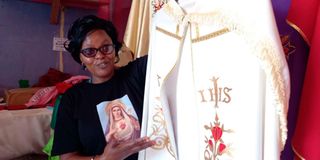Dressing the Catholic clergy is my business

Margaret Rukanga displays one of the vestments she is designing. Her business, located in Kagumo town in Kirinyaga County, employs four workers.
What you need to know:
- In a week, Margaret Rukanga receives orders of about 10 vestments.
- Her business peaks in June and December when the church is ordaining new clergy.
At Margaret Rukanga’s tailoring shop in Kagumo town in Kirinyaga County, workers are busy stitching, embroidering and ironing.
Unlike most tailoring outlets that sell custom-made fashion pieces, Ms Rukanga’s business, St Margaret Clitherow Vestment, exclusively designs liturgical.
We find chasubles, the ceremonial outer robes that priests wear for Mass, on display, one is white, featuring a red, blue and green pattern, while the other is a traditional cream decorated with gold embroidery.
Margaret makes vestments for priests and robes for seminarians of the Roman Catholic Church, a skill she acquired while working as a marketer for the Good Shepherd Sisters in Embu County. Her job at the time entailed advertising and selling vestments made by nuns at the premises.
In the five years she worked there, she learnt how to make the religious garments, leaving in 2016 to start a business of her own.
"I had not decided what type of business I would venture into until one of the nuns at the convent advised me to make liturgical garments,” she says.
She approached the church administration with her business idea and was allowed to carry out the business.
The former Sunday school teacher says that she started her unique business with a capital of Sh35,000 drawn from her savings. With the amount, she bought a sewing machine, a roll of fabric and rented a room in which she would pay a monthly rent of Sh2,500.

Margaret Rukanga displays one of the vestments she is designing. Her business, located in Kagumo town in Kirinyaga County, employs four workers.
She also employed a friend whom we had worked with at the convent to help. Finding customers for the new venture was not difficult since she had a rich network from her previous job.
“I would also visit parishes in neighbouring counties to inform them about my new business, hoping they would buy from me,” she says, adding that she also marketed her products on social media.
Two years after starting the business, she imported an embroidery machine at a cost of Sh560,000 which she now uses to make decorative patterns on the garments.
She has since expanded the business and employed four more workers – she manages her business with the help of her son Joseph Rukanga.
Good-tailored vestments
Margaret says that not every professional tailor can make good-tailored vestments, therefore she has had to train her employees on how to sew the garments.
“But it is easier to train tailors who are already good at making men’s outfits since they are used to it,” she explains.
She sources her fabric from the Nairobi Textiles for Sh20,000 a roll, but imports materials that are unavailable locally from India. She makes chasubles, which are sleeveless outer garments worn by priests during Mass, and albs, the loose-fitting white robes priests wear under the chasubles.

Margaret Rukanga stitching one of the vestments she is designing. Her business, located in Kagumo town in Kirinyaga County, employs four workers.
She also sells copes, long cloaks that are open in the front and fastened at the breast with a band worn by bishops of the church. She also tailors cassocks, black robes worn mainly by male seminarians.
Other products you will find at her shop are alter linen and covers. A cope costs Sh12,000 while a chasuble goes for Sh10,000, a cassock Sh3,000 and a set of alter linen for Sh800 a set.
In a week, she receives orders of about 10 various kinds of vestments. She does most business in June and December when the church is ordaining new clergy. The number of sales she makes is also determined by the type of liturgical season that the church is celebrating, for instance this past Easter when priests wore the white-coloured chasubles to mark the celebrations.
From June 1 to November 22, they will be expected to dress in the green-coloured chasubles, which signify an ordinary time in the Catholic Church calendar.
Main customers
“I am currently making green chasubles to meet the demand in the incoming liturgical season of the church,” says Margaret, who strictly sells the garments only to registered member of the Catholic clergy.
“I consult specific priests in every diocese who help to identify and confirm every customer that makes an order to avoid selling to impersonators,” she explains.
Her main customers are Catholic clergy from Ghana, Tanzania and Uganda, locally, she mainly sells to Catholic parishes in Mombasa and Nairobi counties.
Before the pandemic hit, she would make approximately Sh300,000 monthly, but the amount has significantly reduced due to closure of churches and the lockdown between some counties.





